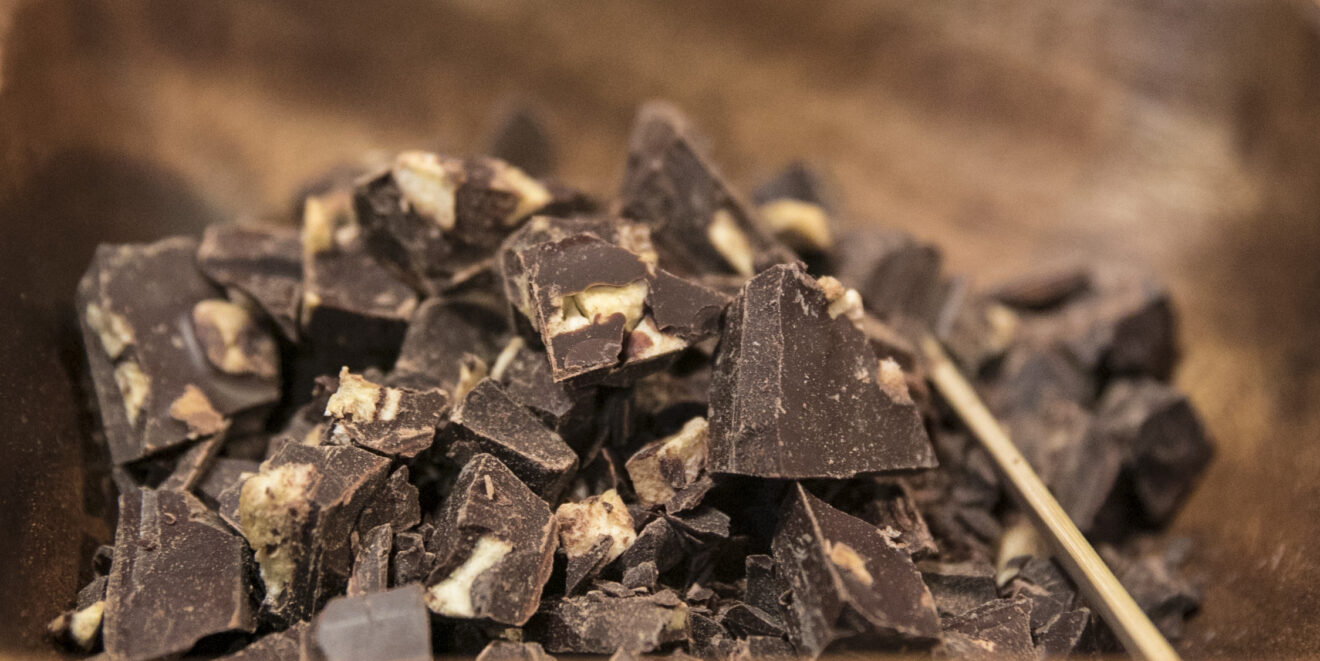Indulgence and sustainability came together at The Big Chocolate Show in New York City over the weekend, as about 200 exhibitors displayed their sweet treats and shared the stories behind them.
Attendees got the chance to try everything from rich French truffles to chocolate inspired by Ayurvedic medicine. They learned to pair chocolate with coffee and wine, sipped cocoa-inspired cocktails and discovered the factors that go into making a quality chocolate bar.
The event kicked off Chocolate Week NYC, which runs through Oct. 5 and includes confectionary deals at restaurants and chocolate shops throughout the city.
As in most other areas of food and beverage production these days, traceability, transparency and sustainability were hot talking points among many of the exhibitors and presenters.
In his talk on what goes into making an excellent chocolate bar, Galo Pazmino of Ecuador-based Pacari Chocolate, stressed three things – the bean, the processing and the farmer. Chocolate makers can ensure a steady supply of quality beans only by supporting the farmers who grow them and ensuring they’re being paid enough to stay in business and support their families and their employees, Pazmino said.
Pacari sources its beans from about 4,000 small farmers in Ecuador who also grow other crops. The company works with the growers to help them earn organic certification.
The focus on the cacao growers was top-of-mind with other companies at the show, and many stressed the provenance of their beans.
Pastry chef Bryan Graham created bean-to-bar chocolate company Fruition Chocolate Works and Confectionary seven years ago in upstate New York. Graham, who started learning his chocolate craft at the Culinary Institute of America, created a company that sources organic, ethically grown beans to handcraft his chocolate, said wife and business partner Dahlia Graham.
When Fruition began, bean-to-bar was a rarity, she said, and today it’s a growing movement.
Australia-based Loving Earth sources all the beans for its vegan chocolate from growers in Peru. The company has been focused on sustainability since it launched 12 years ago – all of the packaging is compostible and printed with vegetable-based ink, said Andrew Meseha, the company’s representative at the show.
Loving Earth has worked with its cacao growers to ensure they make enough money to stay in business. Today they grow about 200 tons of beans and they’re on track to double production, Meseha said.
Coffee and cacao beans grow in similar climates and Moka Origins grows, processes and sells both. Co-founder Jeff Abella started working on humanitarian efforts in Cameroon, West Africa, more than a decade ago. His work with farmers led to a land grant, giving the startup land to grow its own cacao and coffee beans.
Arpita Kohli’s daughter, Mishti, has allergies that put many foods off limits, which spurred Kohli to create a line of vegan chocolates that the whole family could enjoy. The New Jersey-based company, named after Mishti, now makes and sells 16 different flavors of vegan bars including milk chocolates and a dark chocolate bar with toffee.
Creating a vegan toffee was especially tricky and many of the recipes involved some trial and error, she said.
“I’m a textile designer by training – I like a challenge.”
Some other brands featured at the show included:
- Hagelswag, an Amsterdam-based startup making breakfast chocolate that can be sprinkled on toast, pancakes or cereal.
- Jessie’s Nutty Cups, a New York-based startup by actress Jessica Taige, whose peanut butter cups proved such a hit at a party four years ago that they’re now her full-time job.
- Raw Chocolate Love, which sells raw antioxidant-rich organic chocolate bars that are sold in health food stores.
- Elements Truffles, made according to the principles of Ayurveda.
Chocolate by the numbers:
- 400 – The number of cocoa beans in a pound of chocolate
- $385 – The price tag on the world’s most expensive chocolate bar
- 12,700 – In pounds, the weight of the world’s biggest chocolate bar
- 12 – In pounds, the amount of chocolate the average person eats in a year
- 1847 – The year Joseph Fry invented the first chocolate bar
Source: The Big Chocolate Show
____________________________________________
If you enjoyed this article, sign up for Restaurant Smartbrief to get news like this in your inbox, or check out all of SmartBrief’s food and travel newsletters as we offer more than 30 newsletters covering the food and travel industries from restaurants, food retail and food manufacturing to business travel, the airline and hotel industries and gaming.
